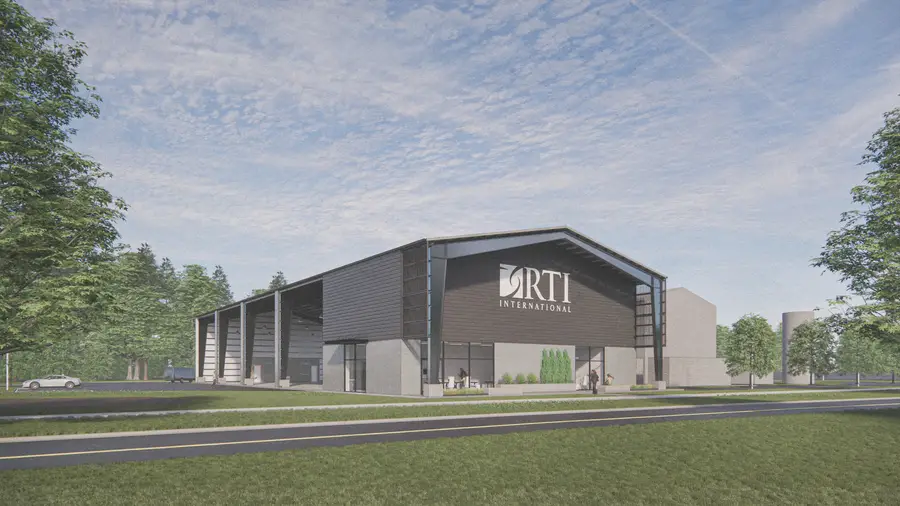
New energy innovations are needed to increase our energy supply and provide a more secure, affordable and resilient power grid with a lower carbon footprint. Consumers and industry leaders are seeking energy that is dependable without increasing cost for consumers or polluting the earth. Besides renewable energy sources, other emerging technologies can address this need but require additional development and testing under real-world conditions to advance their maturity. Many emerging technologies stall at the early research stage due to limited ability to test at industry-relevant scale.
How the RTI Pilot Xcelerator Drives Innovation in Sustainable Energy Technologies
RTI is helping to bridge this gap by advancing laboratory-scale innovations into industry-relevant technology demonstrations in our expanded Pilot Xcelerator facility. Recently, we helped commercial partners Syzygy Plasmonics and Lydian Labs demonstrate new technologies that convert carbon dioxide into sustainable aviation fuel (SAF) with lower carbon intensity than conventional jet fuel. Successful demonstrations like this can accelerate the commercialization of novel energy technologies by validating performance at scale to reduce technological risk.
Located in North Carolina, RTI’s Pilot Xcelerator is one of the few privately-owned energy pilot laboratories in the United States. It offers flexible, plug-and-play infrastructure and expert support for innovators, startups, and energy companies to bridge the critical gap between lab-scale research and commercial readiness. The facility has supported bench- to pilot-scale projects in carbon capture, biomass and methane conversion, sustainable petroleum replacements, and more. RTI recently launched an expansion of this facility to increase capacity for scale-up projects. Construction of the expansion will be completed in 2026.
We spoke with David Dausch about RTI’s history of achievements in energy research and how ongoing investments in this area will advance energy solutions to create affordable, reliable energy. David serves as Vice President of Technology Advancement & Commercialization at RTI, leading more than 60 staff members, including experts in decarbonization and novel energy solutions.
Q: Tell us About RTI's Energy Technology Scale-up Work
In 2013, RTI opened a facility for energy technology development and scale-up with the goal of bridging the gap between early university research and industrial development. The facility provides the physical space, infrastructure, and expert engineering staff to demonstrate process technologies at the critical transition from laboratory to small pilot scale. We help advance early-stage energy technologies through engineering development at larger scales to derisk the technologies and prove effectiveness at those larger scales. We have engaged many commercial partners to help move early-stage energy innovations toward market readiness.
The foundation of our energy work is from several decades of U.S. Department of Energy (DOE) funded research and development. We have built core process units at the bench to small pilot scale, including a biomass pyrolysis unit for converting solid waste to biofuels at a 1 ton-per-day scale, a carbon capture unit capable capturing over 100 kg of CO₂ per day from real flue gas sources, and a Fischer-Tropsch fuel conversation unit to covert methane or syngas (CO + hydrogen) into usable fuels and chemicals (e.g., SAF or methanol) at production scales of up to 2 barrels per day. These process units can augment the efforts of our commercial partners to test their process technologies under real-world conditions.
Q: How Have our Researchers used the Facility to Solve Industry-specific Problems?
Our researchers work with clients across the globe to develop and demonstrate novel energy solutions. For example, with funding from DOE, we are partnering with SLB (formerly Schlumberger Limited) and CEMEX to demonstrate RTI’s carbon capture solvent to mitigate CO₂ emissions from cement manufacturing plants. We also demonstrated this technology for capturing CO₂ from a 12-megawatt natural gas power plant at Technology Center Mongstad in Norway. This technology can provide cleaner power sources to support the growth of data centers and the demand for electricity-grid growth while reducing carbon footprint.
In other areas, we have helped energy companies test new catalysts and process innovations to increase the efficiency of biomass conversion to biofuels such as biodiesel and SAF. We are also working with Casale, SA and other industry partners through funding from the Advanced Research Projects Agency-Energy (ARPA-E) to demonstrate the production of ammonia and methanol using renewable power at industry-relevant scales.
Q: Why is the RTI Pilot Xcelerator expanding?
Based on the success of RTI’s energy scale-up work, we are expanding our demonstration facility to create the Pilot Xcelerator – a unique plug-and-play facility for scaling energy innovations. We work with commercial clients to design, install, test, and optimize energy and related processes to demonstrate performance at scale. We engineer and test integrated industrial processes, complete balance of plant designs, evaluate safety and hazards of operation, etc. The new facility will feature open, covered process bay space with power, gas supply, process water, safety monitoring, and more. This expansion will more than double our current capacity, creating opportunities for new projects and client partnerships.
Q: What is Your Hope for the Future of the RTI Pilot Xcelerator?
Our vision for the Pilot Xcelerator is to create a hub for process development to enable a pipeline of commercial-ready technologies for a range of deep tech sectors, including energy, sustainable materials (e.g., steel, critical minerals), and agriculture (fertilizer production, anaerobic digestion). The core process units can be developed, optimized, and demonstrated at a small pilot scale on their journey to market adoption. Our aim is to transform innovative ideas into a reality.

